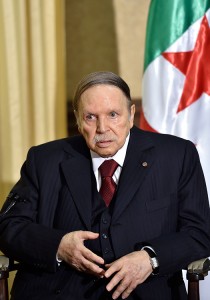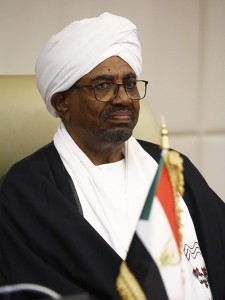African Leaders Fall
Monday, April 29th, 2019April 29, 2019
Earlier this month, two long-ruling leaders lost power in northern Africa. In Algeria, President Abdelaziz Bouteflika was forced to resign after 20 years in office. In Sudan, President Umar (Omar) al-Bashir was toppled from power 30 years after seizing control in a military coup d’état (forced government takeover). While Bouteflika and al-Bashir were technically democratically elected presidents, their rules more closely resembled dictatorships. Their grips on power had allowed Algeria and Sudan to avoid the political and social changes in nearby countries brought on by the Arab Spring of 2010 and 2011.

On April 2, 2019, Algerian President Abdelaziz Bouteflika resigned after 20 years in power. Credit: © Eric Feferberg, AFP/Getty Images
Bouteflika, a former military officer, has a long history in Algerian politics. He fought in the Algerian War (1954-1962) for independence, entered government service in 1962, and participated in a coup d’état in 1965. In 1981, Bouteflika was accused of corruption and left Algeria. He returned to the country in 1987, after the government dropped the charges.
In 1999, the military supported Bouteflika as a presidential candidate. He became president in an election marred by charges of vote fraud. In 2004, he was reelected as president against little opposition. During his second term, Bouteflika forced a constitutional amendment that removed a two-term limit on presidents. He was then reelected president in 2009. In 2014, he was reelected with little opposition, despite having suffered a stroke that impaired his mobility and speech. A constitutional change in 2016 reinstated a two-term presidential limit—but it did not apply to Bouteflika. The president was rarely seen during his fourth term, spending much time in France receiving medical attention.
In February 2019, protests erupted in Algeria after the ailing Bouteflika announced his intention to run for a fifth term in office. In March, he decided against running for president, but protests against his administration continued. On April 2, Bouteflika bowed to pressure and resigned as president. He was temporarily replaced by the chairman of the upper house of parliament, Abdelkader Bensalah—a longtime Bouteflika ally. Protests then continued against Le Pouvoir (The Power, or “the establishment”). A presidential election in Algeria is scheduled for July 4.

On April 11, 2019, Sudanese President Umar (Omar) al-Bashir was forced from office and arrested after 30 years in power. Credit: © Ashraf Shazly, AFP/Getty Images
In Sudan, al-Bashir led a group of military officers that overthrew the existing government in 1989. Al-Bashir dissolved the nation’s legislature and replaced it with a military council. He suspended the constitution and banned all political parties. In 1993, the military council appointed al-Bashir president. He was then formally elected in 1996. Political parties were legalized in 1998, but only al-Bashir’s party participated in the 2000 presidential election, which he won easily. Since then, opposition parties have continued to exist, but their leaders have often been harassed or arrested and detained.
In 2003 and 2004, the Sudanese government put down a rebellion in the western region of Darfur. Some 300,000 people died in the violence, and more than 2 million others were forced into camps. There was no presidential election in 2005, but al-Bashir remained in power. In 2009, the International Criminal Court (ICC) ordered the arrest of al-Bashir for his role in the Darfur violence. The court charged him with war crimes and crimes against humanity. Despite the charges, al-Bashir won an election tainted by charges of vote fraud in 2010. Later that year, the ICC also charged al-Bashir with genocide, but he was not arrested. In 2015, al-Bashir was reelected president with 94 percent of the vote—his standard margin of victory.
In late 2018, widespread protests erupted in Sudan over the rising cost of living and a struggling economy. In January 2019, the protests focused on ending al-Bashir’s long, autocratic, and often harsh rule. In February, the president declared a state of emergency that tightened his personal power and greatly limited the freedoms of the Sudanese people. On April 11, military leaders removed al-Bashir from office and arrested him. They dissolved the government and suspended the constitution. They also announced that a military council would govern the country for the next two years, after which elections would be held. Protesters at first expressed support for the removal of al-Bashir. However, protests resumed when it became clear that a civilian government would not be immediately formed.


